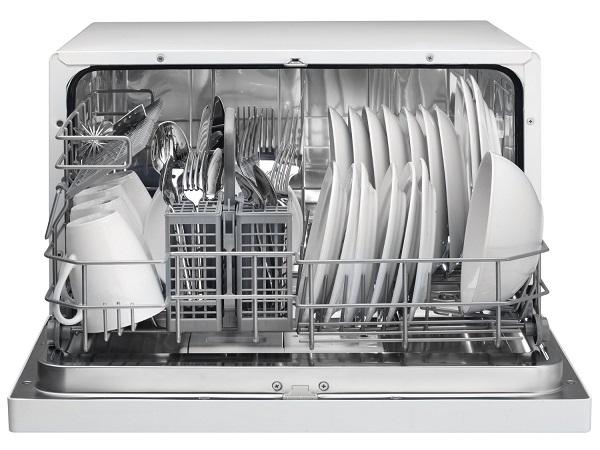If you're renting, have very little room in your kitchen or just don't have a way to pipe water to a new appliance, then a countertop or portable dishwasher may be the answer. Don't just jump on the first one you see, though. There are a lot of considerations before choosing one of these appliances.
Portable vs. countertop
Portable and countertop dishwashers aren't the same thing. Both of these type of dishwashers connect temporarily to a sink faucet, yes. One sits on a countertop, though, and the other is on rollers and can be stored in a pantry or rolled into a corner when not in use.
The biggest difference between a portable dishwasher versus a countertop dishwasher is the number of dishes they can wash. A countertop dishwasher can only wash a few place settings at a time. Forget washing pots and pans. With most units they just won't fit. Portable dishwashers, on the other hand, can wash just as much as a built-in dishwasher. Plus, pots and pans don't need to be washed by hand.
Another difference is water usage. Countertop dishwashers only use around 2 gallons (around 7.5 liters) of water. Portable and built-in dishwashers use can use as little as 3 gallons per load (around 11 liters). Handwashing uses up to 27 gallons of water, so any dishwasher is better than suffering through washing dishes in the sink. It once again comes back to how many dishes you can wash. If a countertop washer only saves one gallon of water per load, but can only wash four place settings, then the obvious choice would be to purchase a portable if size isn't a problem.
A countertop dishwasher is usually the best choice for people who have nowhere to store a portable dishwasher when it's not in use. It isn't a good choice for people that have little counter space, though. It also isn't a good choice for people that have tons of counter space, but none right next to the sink, since it needs the sink to function.
Pro tip: If your space is limited, but you really want a dishwasher, make it multipurpose. Get a portable that has a butcherblock top. Then, you can use it as an island for prepping meals and use it to clean your dishes.
Portable dishwasher considerations
The biggest considerations with this type of dishwasher are the settings. Most portables have many of the same features as built-ins. You can check out our portable dishwashers reviews here, to find the best one for you.
Another consideration is size. Even if you can move it, you still need to consider size. This way you know if you have room to store it when it isn't in use. Most portable dishwashers range from 18 inches (46 centimeters) wide, 36 in (91 cm) tall and 26 in (66 cm) deep to around 24 in (61 cm) wide, 37 in (94 cm) tall and 30 in (76 cm) deep.

You should also consider sound. Remember, this is a full-size dishwasher without the noise dampening of cabinets and walls around it. Look for units that boast quiet operation as a feature.
When shopping, some sites will list the unit's noise level. The lower the decibel rating, the better. Typical dishwashers have a noise level of 63 to 66 dBA. Quieter portable units have a decibel rating of around 55 dBA, which is about as loud as a microwave.
Countertop considerations
Countertop dishwashers come with many different features. The biggest considerations is size.
If you're planning on moving it from one counter to another, choose a light one. These washers can range from around 10 to 50 pounds (around 4.5 to 22.6 kilograms).
Even if you're not planning on moving it, you also need to think about how much space it will take up on your counter. Most units are around 22 in (56 cm) wide, 17 in (43 cm) tall and 20 in (51 cm) deep, though there are bigger units. Be sure to measure your countertop before shopping.
Size typically corresponds to how many place settings you can wash at once. Units range from a four place setting to six place setting capacity.
Another consideration is noise. You can find countertop dishwashers with a noise level of 55.
Warning! You may not have a water source
Your potential kitchen friend is going to need a water source. Portable or countertop dishwashers have a hose that attaches temporarily to the faucet of your kitchen sink. This only works if your sink faucet has a threaded faucet spout. Faucets that have built-in sprayers, for example, don't have threaded faucet spouts.
Don't cancel your dishwasher plans just yet. It is possible to remove the aerator (the faucet's perforated cover that creates a spray) and install an adapter. If you're purchasing this type of dishwasher to avoid using tools or altering the sink in any way, then this may not be good news.
Before you attempt to remove the aerator—or purchase a dishwasher!-- call your sink's manufacture to see if removal is even possible. You may end up damaging the sprayer, otherwise.
If removing the aerator isn't an option, you will need to permanently plumb your dishwasher. This would totally defeat the point of getting a portable dishwasher.
On the other hand, if you're getting a countertop dishwasher just because you don't have anywhere else to put one, then permanent plumbing may not be a bad option. You would need a plumber to cut a hole in the countertop for the pipe and connect it to your sink's plumbing. If your countertops are granite or marble, you may need for a professional countertop installer to cut the hole to avoid cracking.
After thoroughly considering your options, you will be much better off when choosing your dishwasher. Remember, size, your water source, noise levels and placement are very important when picking out a brand-new portable or countertop dishwasher.
